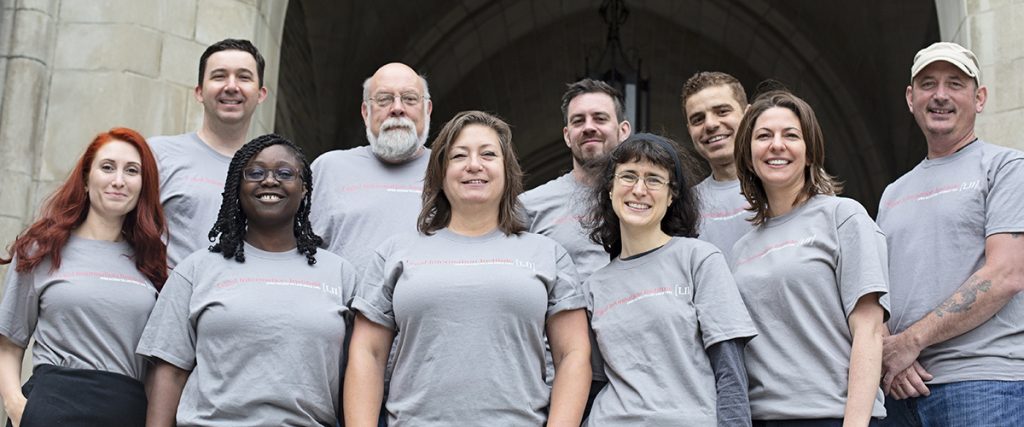Our 2018-2019 Annual Report

LII spent the past year rebuilding and preparing for a big transition, but as far as our audience was concerned, we like to think we didn’t miss a beat – and maybe learned a new trick or two.
During the past year, we replenished our core staff, added a communications specialist, and passed the leadership baton. Jim Phillips is now our new front-end developer; Ayham Boucher, our back-end developer, and Julie Pizzuti, our fundraiser. Neli Karabelova has spearheaded our outreach, spreading the word about the resources we offer, gathering impact stories that help us improve, and keeping us connected to the ever-growing Free Law community. And the biggest change, in case you missed it: in the wake of our co-founder and Director Tom Bruce’s retirement at the end of June, Craig Newton and Sara Frug, the LII’s two Associate Directors since 2013, now lead the LII as Co-Directors.
Some highlights from the past year:
Last fall, we celebrated Constitution Day by publishing a new version of the Congressional Research Service’s (CRS) U.S Constitution Annotated. Unlike the PDF published by CRS, our version is easily searchable, browsable, hyperlinked, and accessible to visually impaired users. The launch was picked up by RollCall, SCOTUSBlog, the American Association of Law Librarians, and others, and the collection has been used over a million times since then.
During the past year, our law students wrote over 70 previews of U.S. Supreme Court cases, which they published on our website and in the Federal Lawyer magazine. They updated our legal reference Wex, supported our accessibility initiative and our work at oyez.org, and, under the leadership of Editor-in-Chief Jocelyn Hackett, helped expand our Women & Justice collection.
LII staff participated in and spoke at a variety of conferences this year, including the Law Via the Internet Conference; the Center for Computer-Assisted Legal Instruction (CALI) annual conference; the International Conference on Artificial Intelligence and the Law; and the New York State Civil Legal Aid Tech Conference.
We embarked on an overhaul of the more than 600,000 pages of the LII website in order to meet modern web accessibility standards. As we go through each collection, we’ve been adding machine-readable information to help external search engines find our content and streamlining our own search results to make them easier to use.
All of this work has helped us reach a constantly-evolving audience of people and machines. On March 7, 2019, the Legal Information Institute became a truly global source of information when our first visitor from Antarctica came to www.law.cornell.edu. That reader joined over 30 million other people from all around the world who came to our website more than 53 million times in the last year, as well as another 7.5 million unique visitors making over 15 million visits on our other website, www.oyez.org. The two websites have appeared in over 1.16 billion search results in the last 12 months.
We saw traffic from 3207 universities, 274 community colleges, and 811 school districts, as well as 1669 hospitals and 2967 banks. We had visitors from the Berklee College of Music and the Berkeley National Laboratory as well both the Environmental Protection Agency and the William Morris Agency. Tens of thousands of user sessions originated within the internal networks of the United States Senate, House of Representatives, and Supreme Court. The Administrative Office of the US Courts alone was responsible for more than 90,000 sessions. Within the executive branch, the VA, DOD, and DOJ were our three largest customers.
The Washington Post was among the top sources of referral traffic to the LII site this year, along with Wikipedia and every major social media platform. A little further down that list we find Google Classroom, GovTrack, uscourts.gov, the ABA, CNN, MSN, NPR, the Atlantic, SCOTUSBlog, Slate, Politifact, the National Review, NBC News, the Library of Congress, the New York Times, Fox News, and Forbes.
On a more individual level, an awful lot of people sent us notes. A few of our favorites:
“As in house counsel for a nonprofit, I appreciate the access very much.”
“I’m a state lawyer. I use Cornell’s website almost daily.”
“We work in healthcare, we could not make it through a day without you all!”
“I rely on original sources rather than someone else’s interpretation of them. LII gives me access to much of what I need to know.” or “I love this site because it’s the only one, on the first page of Google results, that doesn’t include someone’s opinion. It is the law as written, officially.”
“When citizens have access to clear information, they can make better choices and the nation benefits. Knowledge is empowering. Thanks for what you do.”
And last, but not least: in the past year, your donations made it possible for all of this to happen while we continued to operate within our budget. Beyond that, in honor of Tom Bruce’s retirement, we were able to raise an additional $130,000 to establish the Tom Bruce Legal Innovation Fellowship Fund, which will provide an annual fellowship (usually during the summer months). The Fellow will explore new technologies and techniques of potential application within legal informatics, computer science, or legal tech, helping us continue to innovate while maintaining our ever-expanding collection of information resources. We would not have been able to do any of this without your support. Thank you!



I find the rapid publication of Supreme Court cases very helpful. When did I last contribute?